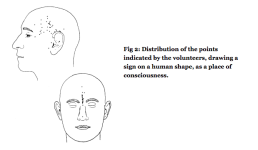ruby sparks
Contributor
Claim: Self is an illusion.
An illusion is not something that is not there, it is only something that is not what it seems to be.

Humans generally seem to find it easy and natural to locate their centre of conscuiosness.
Of 59 participants in an experiment, 90% identified a location in their bodies for the centre of their consciousness, where their self was felt to be.
83% identified that location to be in their head, between and behind the eyes, as per the dots on the diagram above. That is also where I would have chosen.
There is nothing located in any particular part of the body (or outside of it) where there is a self.
Therefore, self is an illusion, or if you prefer, a subjective sense of self, when it is present (it isn't always or fully) generally seems to involve an illusion, at least the illusion that it has or acts through a centre.
Point Zero: A Phenomenological Inquiry into the subjective Physical Location of Consciousness
http://en.asia.it/adon.pl?act=doc&doc=787
An illusion is not something that is not there, it is only something that is not what it seems to be.

Humans generally seem to find it easy and natural to locate their centre of conscuiosness.
Of 59 participants in an experiment, 90% identified a location in their bodies for the centre of their consciousness, where their self was felt to be.
83% identified that location to be in their head, between and behind the eyes, as per the dots on the diagram above. That is also where I would have chosen.
There is nothing located in any particular part of the body (or outside of it) where there is a self.
Therefore, self is an illusion, or if you prefer, a subjective sense of self, when it is present (it isn't always or fully) generally seems to involve an illusion, at least the illusion that it has or acts through a centre.
Point Zero: A Phenomenological Inquiry into the subjective Physical Location of Consciousness
http://en.asia.it/adon.pl?act=doc&doc=787
Last edited:
